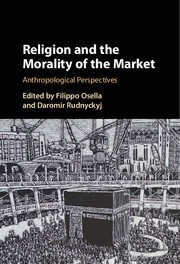Book contents
- Frontmatter
- Dedication
- Contents
- List of Figures
- List of Contributors
- Acknowledgments
- Introduction: Assembling Market and Religious Moralities
- 1 Risk, Fate, Fortune: The Lives and Times of Customs Inspectors in Southern China
- 2 Morality, Markets, and the Gospel of Prosperity
- 3 Religious Myths Retold: Masters and Servants in India's Corporate Culture
- 4 Divine Markets: Ethnographic Notes on Postnationalism and Moral Consumption in India
- 5 Merit Economies in Neoliberal Times: Halal Troubles in Contemporary Sri Lanka
- 6 “Structural Adjustment Islam” and the Religious Economy in Neoliberal Mali
- 7 Assembling Islam and Liberalism: Market Freedom and the Moral Project of Islamic Finance
- 8 Persistent Forms: Catholic Charity Homes and the Limits of Neoliberal Morality
- 9 Marketizing Piety through Charitable Work: Islamic Charities and the Islamization of Middle- Class Families in Indonesia
- 10 “A Poor Muslim Cannot Be a Good Muslim”: Islam, Charitable Giving, and Market Logic in Sri Lanka
- 11 “For God and the Country”: Agricultural Migrations and their Moralities in South India
- 12 “The Globalization of Indifference”: On Pope Francis, Migration and Global Acedia
- Index
- References
6 - “Structural Adjustment Islam” and the Religious Economy in Neoliberal Mali
Published online by Cambridge University Press: 13 April 2017
- Frontmatter
- Dedication
- Contents
- List of Figures
- List of Contributors
- Acknowledgments
- Introduction: Assembling Market and Religious Moralities
- 1 Risk, Fate, Fortune: The Lives and Times of Customs Inspectors in Southern China
- 2 Morality, Markets, and the Gospel of Prosperity
- 3 Religious Myths Retold: Masters and Servants in India's Corporate Culture
- 4 Divine Markets: Ethnographic Notes on Postnationalism and Moral Consumption in India
- 5 Merit Economies in Neoliberal Times: Halal Troubles in Contemporary Sri Lanka
- 6 “Structural Adjustment Islam” and the Religious Economy in Neoliberal Mali
- 7 Assembling Islam and Liberalism: Market Freedom and the Moral Project of Islamic Finance
- 8 Persistent Forms: Catholic Charity Homes and the Limits of Neoliberal Morality
- 9 Marketizing Piety through Charitable Work: Islamic Charities and the Islamization of Middle- Class Families in Indonesia
- 10 “A Poor Muslim Cannot Be a Good Muslim”: Islam, Charitable Giving, and Market Logic in Sri Lanka
- 11 “For God and the Country”: Agricultural Migrations and their Moralities in South India
- 12 “The Globalization of Indifference”: On Pope Francis, Migration and Global Acedia
- Index
- References
Summary
This chapter analyzes some of the dramatic and much-discussed changes in modalities of religious expression, including ways of being Muslim and modes of belonging in contemporary Mali, a secular state (laïc on the French model) whose population is overwhelmingly Muslim. I do not directly address the 2012 Islamist takeover of northern Mali that received considerable international media attention, particularly when Islamists destroyed Muslim saints’ tombs in places like Timbuktu, but rather broader transformations in relation to which those developments must be understood. This is part of a larger ongoing effort inspired by the work of Max Weber in such works as Economy and Society (1978) as well as some of Weber's interpreters to grapple with how “religion” and “economy” intersect and influence each other over time. Religion and economy – abstractions for understanding religious and economic practices – have long been deeply intertwined in this part of West Africa, perhaps most notably in the direct involvement of Muslim scholars and religious leaders in such economic activities as the precolonial trans-Saharan trade in gold, salt, and slaves that spanned centuries (see Lydon 2009). What I want to do here is build upon some of my earlier analysis of religion and economy in Mali to understand religion in the current era.
However, I would like to emphasize the need to proceed cautiously in any such discussion of religion and economy. Rather than treating religion, as in some older models, as a mere function of political economy, a form of adaptation or resistance, or culture, for example, in reified, static notions of “African Islam” or African “traditional” religion, as I argue, one must analyze religion – understood as discourses and practices encompassing modalities of religious expression – as a heterogeneous field in which there is considerable debate, contestation, and transformation. Arguing against equally simplistic and teleological models of Islamization, reform, and totalizing notions of ethical self-fashioning, I draw on research on transformations in religious practice to propose new ways of thinking about religion that foreground how religious practice has changed in the context of Mali's neoliberal reforms.
- Type
- Chapter
- Information
- Religion and the Morality of the Market , pp. 138 - 159Publisher: Cambridge University PressPrint publication year: 2017



